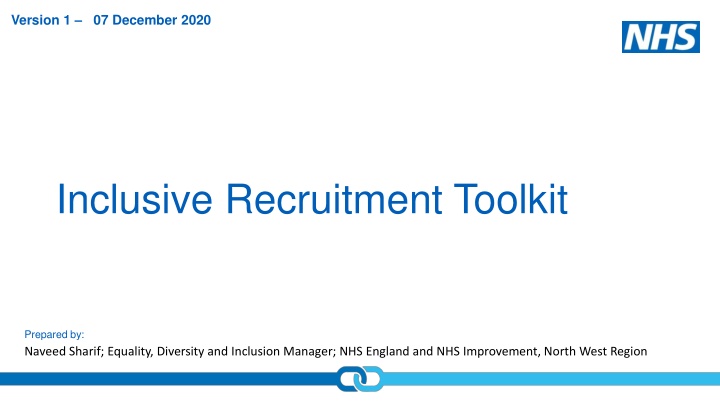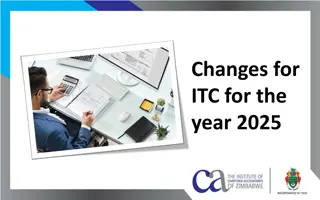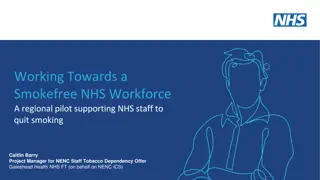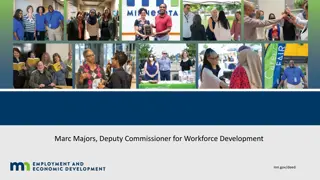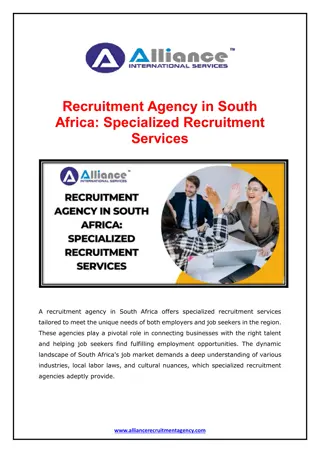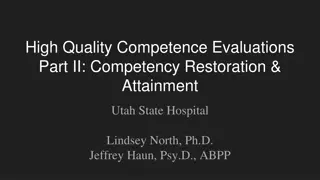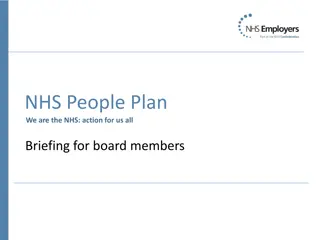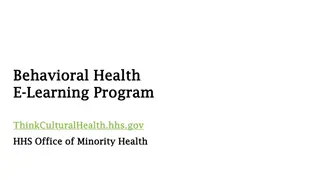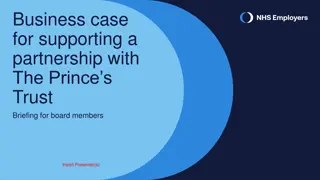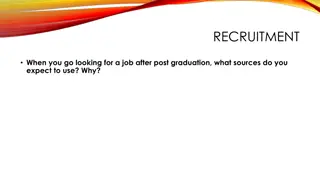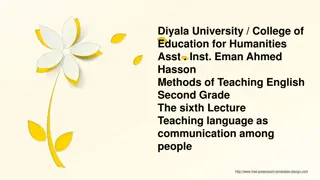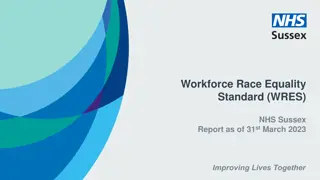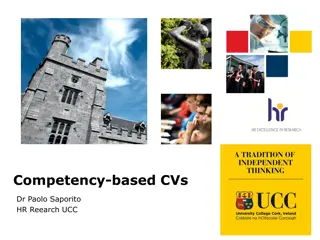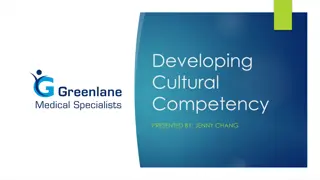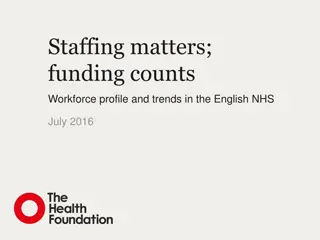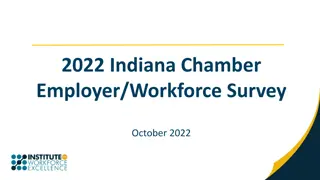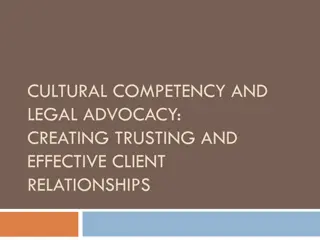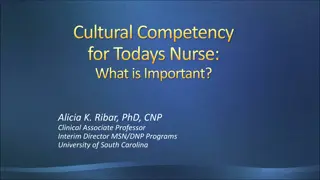Enhancing Cultural Competency in NHS Workforce Recruitment
Diverse recruitment practices in NHS England are crucial for promoting inclusion and improving healthcare quality. This toolkit provides insights and strategies to address barriers faced by various communities during job interviews. Topics covered include cultural sensitivity, representation, unconscious bias, and support methods to foster a more inclusive workforce environment.
Download Presentation

Please find below an Image/Link to download the presentation.
The content on the website is provided AS IS for your information and personal use only. It may not be sold, licensed, or shared on other websites without obtaining consent from the author.If you encounter any issues during the download, it is possible that the publisher has removed the file from their server.
You are allowed to download the files provided on this website for personal or commercial use, subject to the condition that they are used lawfully. All files are the property of their respective owners.
The content on the website is provided AS IS for your information and personal use only. It may not be sold, licensed, or shared on other websites without obtaining consent from the author.
E N D
Presentation Transcript
Version 1 07 December 2020 Inclusive Recruitment Toolkit Prepared by: Naveed Sharif; Equality, Diversity and Inclusion Manager; NHS England and NHS Improvement, North West Region NHS England and NHS Improvement
Introduction Ensuring our workforce reflects the community we serve and champions inclusion is the first step in delivering high quality and safe healthcare. It is important that all our staff feel that they can bring their whole selves to work and that their potential is recognised, nurtured and supported to grow where ever they work across the Trust. NHS England have identified that people from a range of backgrounds can face barriers when applying for jobs in the NHS and face increased inequalities across the workforce. In response to these inequalities the Workforce Race Equality Standard (WRES) has been included across all NHS NHS England and NHS Improvement contracts in England and measures organisations against a set of nine workforce metrics, one of which is targeted specifically on recruitment.
This toolkit should support you as a manager to understand the variety of barriers and circumstances that can lead to inequalities existing for BME, People of different ages, People with Disabilities, LGBT and people from other communities when attending job interviews in the NHS. You will also find practical steps and advice on what you can do to improve your own recruitment activity, support staff you manage with their career development and improve the Trust s performance in relation to the WRES, WDES and future NHS England equality standards. workforce NHS England and NHS Improvement About this toolkit
Cultural Sensitivity Representation Unconscious Bias Method Support NHS England and NHS Improvement
Cultural Sensitivity Cultural sensitivity is being aware that cultural differences and similarities between people exist without assigning them a positive or negative value; Awareness of cultural difference isn t enough statements like we are all just people ignore that we are shaped by our own experiences and that those need acknowledged and valued; People start their journey towards improved intercultural sensitivity by accepting that diverse cultures approach situations differently and by developing a curiosity around how people from other cultural backgrounds may respond to environments they are in; Becoming culturally competent means developing the ability to adapt and respond positively to people from backgrounds different to our own. This includes the ability to frame and respond to someone else by engaging in their cultural perspective and not our own; To champion cultural competency is to be able to show empathy for other cultural perspectives and to shift their own responses seamlessly between different cultural environments and the people they are engaging with. 5 |
Being Proactive: NHS England and NHS Improvement
Representation: We can often feel more comfortable either consciously or subconsciously when we are engaging with people with similar backgrounds to ourselves. This is the same during an interview and how the diversity of the interview panel can impact on how comfortable candidates feel. Bias and the impact of social inequalities on our experiences are often complex and difficult to overcome. Ensuring we have diverse representation on our interview panels helps ensure decisions are not influenced by one set of inequalities or cultural bias. As human beings we bring different perspectives and experiences to every situation we encounter. Diversity or lack of it will always therefore have an impact on the outcome of a situation or process. Making judgements about candidates skills rather than the context of the experiences they share can be difficult. Having diverse perspectives on interview panels can support a broader understanding of experiences candidates may share. The diversity of the chair on our interview panels can often play an important role in the ultimate outcome of decisions due to the hierarchal culture that can exist in the NHS. 7 |
Representation 8 |
Talking about our biases is probably still an organisational taboo, but not talking about them doesn t mean they will go away. They will continue to be working insidiously, with no control and without any acknowledgement, but with profound implications. It is important that leaders have conversations about working with unconscious bias and they bear certain factors in mind: Accept that we all have unconscious bias and try to stay open and curious about when and how it might be exerting influence Pay attention to how we are feeling and how this might be getting in the way of how we want to behave especially when we are under stress because our bias is often more extreme in these circumstances Pay attention to patterns of behaviour and challenge ourselves to what might appear to be coincidences as they happen - these may be due to unconscious bias The role of leaders in unconscious bias is to have the courage to start these conversations. It requires bravery, a high degree of self awareness, a sensitivity to language and, above all, compassion Unconscious Bias : (Guardian 2019, p2). 9 |
Growing your network Growing your network This is the fun bit. You are building momentum, getting some successes under your belt and building the energy and reputation of the network. Members and friends Always encourage members to get involved in network activities so the committee isn t seen as a clique. You can do this by asking for volunteers for all activities, or via the discussion forum. The network is owned by its members and friends. Not one individual person. It s non hierarchical. All members and friends have equal responsibility and accountability. You don t need approval. People really value this in the network. Annual Survey It s important to measure success. The best way to get members and friends engaged in what you do is to ask them what they want, and build this into your action plan for the year. This means they can see how it supports them and they may be therefore willing to help. Use an annual survey to evaluate how effective your work is, what worked well, what didn t work well and what people want in the future. Then you can benchmark certain questions every year. For example, confidence levels, how many moved sideways and how many were promoted. This gives you great statistics for your communications too. 10 |
Unconscious Bias 11 |
Keeping momentum Champion Focus on keeping momentum with the champion too. Try different methods to engage with them. For example, you could offer a competition to job shadow them for a few days. Or encourage them to be open about their mentoring work. Reach everyone Reassess whether you are reaching every part of your organisation. Are some members and friends in offices where they are the only person in the network? What can you do to engage them in the network? Can you offer web conferences? Can you offer an anonymous function to giving feedback or raising issues to the head of the network? 12 |
Credits 13 |
